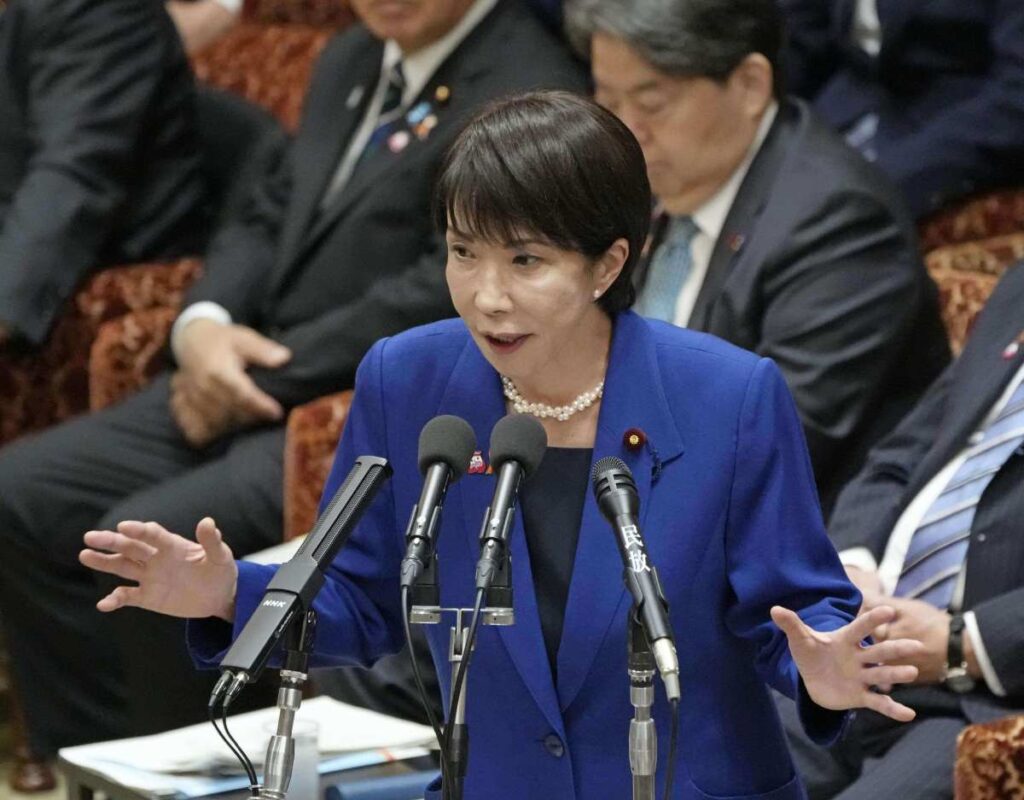Japanese Prime Minister Sanae Takaichi has doubled down on comments detailing the conditions under which her country might join a U.S. military response should China move against Taiwan.
“I made the remark in line with the government’s conventional position, so I will not retract it,” Takaichi said on Monday when pressed by an opposition lawmaker, according to Jiji Press.
Why It Matters
China claims self-ruled Taiwan as its territory and has said unification is inevitable, by force if necessary. In recent years, Beijing has ramped up pressure on the island, including near-daily military flights across the Taiwan Strait and large-scale drills simulating a blockade.
A major Chinese offensive against Taiwan would disrupt global supply chains and strengthen China’s military position relative to nearby Japan—a key U.S. treaty ally that relies on secure sea lanes for 99 percent of its trade. While previous Japanese prime ministers have linked Taiwan’s security to Japan’s own, Takaichi, who took office last month, is the first to lay out a specific scenario that might justify military intervention.
Newsweek reached out to Takaichi’s office and to the Chinese Foreign Ministry for comment.
What To Know
“Taiwan’s situation has become serious. We must assume the worst-case scenario,” Takaichi said on Friday in parliament, according to Kyodo News.
Asked about a potential Chinese naval blockade of Taiwan, Takaichi said such a move would likely aim to prevent U.S. forces from intervening, and that the use of force by warships would could justify a forceful response by Tokyo.
“If it involves the use of military force, it could by all means become a situation of existential crisis,” The Japan News quoted her as saying. While evacuating Japanese nationals would be a top priority, Takaichi said, “we must also be prepared for the worst-case scenario.”
Though the U.S. is obligated under the Taiwan Relations Act to contribute to Taiwan’s self-defense capabilities, successive administrations have left open whether they would directly intervene.
Japan hosts the largest number of American forces outside the U.S., and U.S. and Japanese analysts believe these bases would be early targets in any major offensive against Taiwan.
Japan’s Mutual Defense Treaty with the U.S. requires the East Asian country to defend U.S. troops on its soil, but its postwar constitution limits its use of force overseas. In 2015, the government of former Prime Minister Shinzo Abe reinterpreted the constitution to open the door to “collective self-defense” to assist allied forces.
While previous Japanese leaders have described Taiwan’s security as strategically salient to Japan, Takaichi is the first to so directly tie it to Japan’s self-defense.
In 2021, then-newly resigned Prime Minister Shinzo Abe, whom Takaichi says she regarded as a mentor, said: “a Taiwan emergency is a Japanese emergency, and therefore an emergency for the Japan-U.S. alliance.” That same year, then-Deputy Prime Minister Taro Aso said Japan would be obligated to join a U.S. intervention if China invaded Taiwan, though he later walked back his remarks.
During a budget committee meeting in Japan’s lower house on Monday, Hiroshi Ogushi of the opposition Constitutional Democratic Party of Japan urged Takaichi to retract her statement.
Takaichi declined to do so, arguing it was in line with the previous government’s stance. However, she stated that she would be more careful when broaching the topic in the future, the Asahi Shimbun reported.
What People Are Saying
Wu Jianghao, Chinese ambassador to Japan, wrote on Monday on X: “Taiwan is an inalienable part of China. How to resolve the Taiwan issue is a matter for the Chinese people themselves. If one stirs up the notion that ‘a Taiwan contingency is a Japan contingency’ to bind Japan to the chariot of dividing China, in the end, it will only lead to walking down an irreversible wrong path.”
Lin Jian, Chinese Foreign Ministry spokesperson, told reporters on Monday that Takaichi’s remarks were “extremely egregious. China expresses strong dissatisfaction and resolute opposition, and has lodged stern representations and strong protests with the Japanese side.”
What Happens Next
U.S. defense and intelligence officials believe Chinese President Xi Jinping has ordered the People’s Liberation Army to be capable of taking Taiwan by 2027, though they acknowledged this does not mean Xi has chosen that or any other year to pull the trigger.
During a recent interview on CBS’s 60 Minutes, President Donald Trump said Xi promised him not to take military action against Taiwan, “because they know the consequences.” Trump declined to specify what a U.S. response would be.
Takaichi has called China an “important neighbor” and faces the challenge of balancing ties with both Beijing and Washington, Japan’s top trade partners, amid tensions over Taiwan and a territorial dispute over an island group in the East China Sea.
Read the full article here

